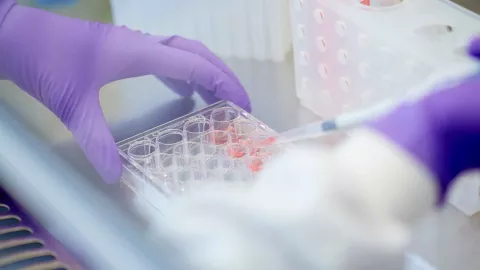
New research reveals the power of microglia in smouldering MS
The brain’s resident immune cells are in overdrive in MS. New research has identified one potential reason why. And, how the cells could be controlled.
Researchers have found why certain cells stay activated during the immune attacks in MS. This suggests a new approach to finding future treatments for people with MS.
Why is this important?
In MS, immune cells from the body mistakenly attack myelin, the protective covering around nerve fibres. This causes damage in the brain and spinal cord, called lesions.
In some brain lesions often found in progressive MS, there are lots of cells around the edge of the lesion which stay active after the attack. You may have heard this process of ongoing damage being called “smouldering MS”.
Some of these cells around the lesion are called microglia. They're the brain’s special immune cells with lots of helpful roles. For example, they can tidy up broken-up myelin in areas of damage. And the body should switch off the microglia once they’ve finished their role in the process.
But in MS, microglia seem to be persistently activated at the edges of lesions. So the cells actually cause damage. Scientists have now identified a potential reason why they aren’t switched off in MS.
What did they find?
Researchers at the University of Cambridge used mice with an MS-like condition and looked closely at their microglia. Specifically at the mitochondria inside, which are the energy powerhouse of a cell. The team found microglia remain active because of how they use their mitochondria.
Inside the mitochondria are lots of energy-driving molecules. The researchers found that a set of molecules, called complex I, were responsible for keeping the microglia active. When the team blocked complex I in mice, they could switch the microglia off. This prevented further damage to nerve cells.
Read more about one of the team who made this finding: Dr Cory Willis
Professor Stefano Pluchino, co-lead of the research, said:
"Our work unravels a previously unrecognized aspect of microglial activation in progressive MS. By targeting mitochondria, we may have identified a promising therapeutic strategy to mitigate damage to nerve cells and improve functional outcomes in progressive MS and potentially also other neurodegenerative diseases."Dr Stefano Pluchino
What does this mean for people with MS?
This research shows a new approach for finding treatments for MS. Researchers could identify drugs which switch microglia off in MS lesions, protecting nerves.
There’s lots more research needed first, but it offers insight into new ways to slow or stop the progression of MS.




